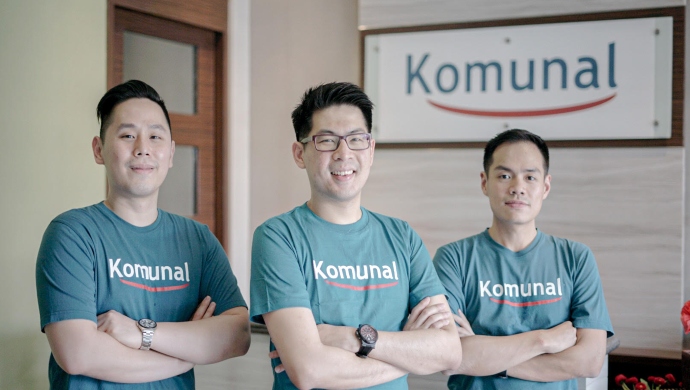
(L-R) Komunal co-founders Rico Tedyono, Hendry Lieviant, and Kendrick Winoto
Komunal, a fintech company offering neo-rural bank services in Indonesia, has received US$2.1 million in its Series A round of financing.
The round, led by East Ventures, saw participation from Skystar Capital. Both had invested in Komunal’s seed round in 2019.
As per a press statement, Komunal will use the new funds to boost financial inclusion in Indonesia by enhancing its product, DepositoBPR.
Launched in 2019, Komunal aims to have reliable credit methodology, alternative data & technology and community partnership with existing rural banks (BPR) and co-operative loan (Koperasi) to improve the funding access to Indonesia’s MSMEs.
The DepositoBPR product enables societies nationwide to access the highest possible government-guaranteed deposit rates from BPRs in any region without visiting the bank.
Also Read: P2P lending platform Komunal raises investment to improve the funding access to Indonesia’s MSMEs
On the other hand, rural banks can source deposits nationwide without incurring the hefty cost of opening additional branches and marketing efforts to attract more deposits. In other words, BPRs can source deposits regardless of the geographical boundaries and convert their higher fixed operational cost to lower variable fees to Komunal by using the platform.
Indonesia has 1,500 BPRs. However, they only account for a 1.5 per cent market share of the entire depositors in the country. Most of these are located in suburban areas and not equipped by digital channels — making their product inaccessible to urban depositors.
Komunal has engaged with 60 BPRs across Java and Bali and launched the beta version of DepositoBPR services in August 2021. The company focuses on doubling the BPR market share by offering a higher rate and more seamless transactions to new and existing clients.
So far, Komunal has disbursed US$50 million of loans to hundreds of SMEs in Indonesia, more than double the amount compared to the same period last year. The company said it would continuously support SMEs in getting credit access, targeting US$150 million of SME loans by next year.
During this pandemic, Komunal strengthened its cash flow with a minimum burn rate as a group — thanks to its lending businesses which has achieved profitability recently.
The neo-bank startup is now planning to launch an “e-billet” feature by the end of 2021.
“Almost all BPR deposits are using physical billet/deposit certificate. It means BPR in Bali, for instance, will need to send the physical deposit (billet) to its depositor in Jakarta (and vice versa when the depositor wants to withdraw their deposit), incurring relatively high logistics costs in the process. The e-billet will effectively eliminate this friction and help our vision to make the product accessible nationwide,” said Kendrick Winoto, co-founder of Komunal.
“We believe a strong partnership between funding agents and rural banks will boost the country’s financial inclusion tremendously. As BPRs have relatively smaller assets than commercial banks, they have dynamic lending and funding needs. While we have seen many fruitful collaborations on the lending side, unfortunately, BPRs don’t have many options to solve their funding needs. However, they offer attractive and safe products,” said Hendry Lieviant, co-founder of Komunal.
Also Read: Philippines, Malaysia, Indonesia, Vietnam have a huge potential in APAC for neobank growth: Study
“During the pandemic, the irony was even clearer. Commercial banks are overflowing with liquidity despite offering record low rates, whilst many BPR had difficulty sourcing deposits because 95 per cent of the country’s depositors reside in urban areas. We hope this platform can bridge the gap. We appreciate OJK and BPR Association support and advice to sharpen this ‘first of its kind’ product,” he added.
Willson Cuaca, co-founder and managing partner of East Ventures, said, “We have heard that many startups provide solutions to unbanked consumers, under-served consumers and non-credit-worthy micro and small businesses. However, none of the solutions addresses rural banks. Komunal introduced the new concept of “neo rural bank” to upgrade smaller banks with advanced capabilities. We hope this approach will accelerate financial inclusion massively and deeper to every Indonesia region.”
As per a recent UnaFinancial report, the Philippines, Malaysia, Indonesia and Vietnam have the highest prospects in Asia for neo bank.
—
Image Credit: Komunal
The post Komunal lands US$2.1M Series A to boost financial inclusion in Indonesia through neo rural bank services appeared first on e27.

